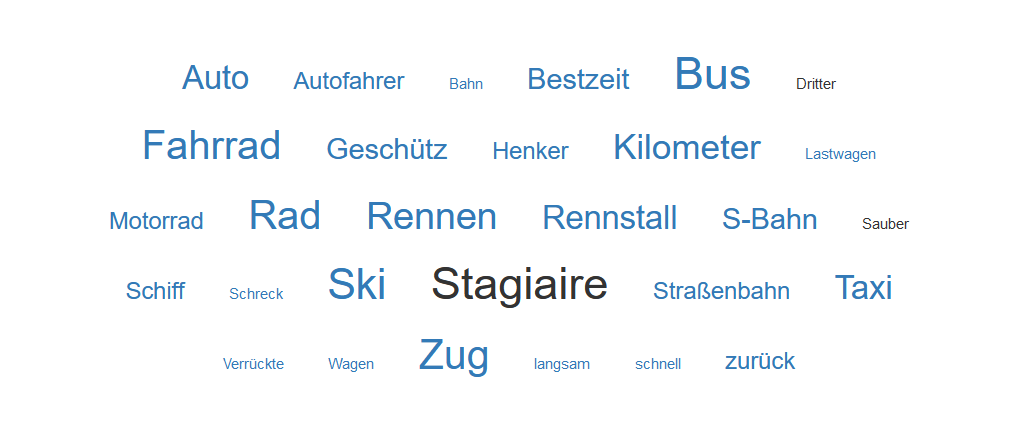Vocabulary Module 4: fahren
In this module, you will learn some vocabulary to talk about the verb ‘to drive’ (fahren) using Das Digitale Wörterbuch der Deutschen Sprache (DWDS), a large electronic collection of German texts known as a corpus. Let’s explore what words German speakers use to talk about fahren. Go to the DWDS main page and type fahren in the search box. Do NOT capitalize the word fahren! (If you capitalize it, you will get results for the noun Fahren, ‘driving’). You will be taken to a page that gives you a lot of information about this word, but we will focus on the word cloud, which is available in the Typische Verbindungen section.
This word cloud shows the words that commonly occur with the verb fahren; such words are known as collocates. The larger the word in the image is, the more often it co-occurs with fahren. You can also see a numerical representation of the frequency of co-occurrence by looking at the Überblick table for fahren accessible through the Detailliertere Informationen link above the word cloud.

Activity 1
After looking at the words in this word cloud, you most likely recognized that many of them are nouns (and are, therefore, capitalized).
A.
First, let’s review the meaning of these nouns by matching them with their English equivalents. If needed, you can consult the online dictionary LEO.
B.
It is important to learn the German nouns together with their articles. Can you find 3 nouns that go with the article der, 3 nouns that go with die, and 6 nouns that go with das?
C.
Based on the list of words in 1A that are associated with fahren, decide how fahren translates into English.
D.
Let’s explore more collocates of fahren. Go to the Detailliertere Informationen link above the word cloud. Then, scroll down to the hat Präpositionalgruppe table. Click (in turn) the following prepositional phrases, to see examples of how fahren is used with them in sentences: nach Haus, mit Auto, in Urlaub, auf Straße.
Activity 2
Which of the words from 1A can be used interchangeably? Select the correct answers.
Below are some DWDS examples of how these words are used with fahren in sentences. To see more usage examples, go to the Überblick table for fahren and click on each word.
- Zwei Drittel der Deutschen sind misstrauisch gegenüber selbstfahrenden Autos, und mehr als 60 Prozent können sich auch nicht vorstellen, mit einem solchen Wagen zu fahren.
Die Zeit, 07.11.2017 (online) - Arbeitnehmer, die mit dem Rad zur Arbeit fahren, können das Finanzamt daran unter Umständen mehr beteiligen als Kollegen, die das Auto und Motorrad nutzen.
Berliner Zeitung, 24.08.1994 - Wer mobil sein will, fährt mit dem Rad zur Straßenbahn, steigt ein paar Stationen später, ohne zu warten, in die S-Bahn um.
Zeit Wissen, 08.04.2009, Nr. 03
Activity 3
The noun Wagen can form compounds with many other words to refer to different types of vehicles. Can you figure out their meaning?
You can find many more compounds with Wagen on top of its DWDS page (click on weitere links to Wortbildung).
Activity 4
The verb fahren can combine with many prefixes to refer to different types of driving, riding, or going.
You can find many more prefix verbs with fahren on top of its DWDS page (click on weitere links to Wortbildung -> mit “fahren” als Letztglied).
Activity 5
A.
Read the sentences with the word fortfahren from the DWDS corpus below.
- Da sie nichts weiter sagte, fuhr ich fort zu lesen.
Rinser, Luise: Mitte des Lebens, Frankfurt a. M.: S. Fischer 1952 [1950], S. 33 - Mit einem Schaumlöffel herausnehmen und gut abtropfen lassen. So fortfahren, bis alle Gnocchi fertig gegart sind. Die beiseite gestellten Beten in kleine Würfel schneiden.
Zeit Magazin, 23.10.2017 (online) - Die guten Momente einer Beziehung im Gedächtnis zu behalten hilft, mit dem Leben fortzufahren.
Zeit Magazin, 28.09.2017, Nr. 40
What is the closest English meaning for fortfahren in these sentences?
B.
Read the sentences with the expression der Zug ist abgefahren from the DWDS corpus below.
- Ich wollte immer Profi-Fußballer werden, aber ich fürchte, mit 51 ist der Zug für mich abgefahren.
Berliner Zeitung, 07.07.2005 - Bis wir zu Entscheidungen kommen, ist der Zug längst abgefahren.
Die Welt, 30.03.2005
What is the closest English meaning for der Zug ist abgefahren in these sentences?
Activity 6
Now, let’s explore Urlaub (‘vacation’), a collocate of fahren.
A.
Search for Urlaub from the DWDS main page and go to its Typische Verbindungen (word cloud). You can see many adjectives and verbs that are frequently used to describe Urlaub. Can you figure out what they mean?
B.
C.
Let’s explore more collocates of Urlaub. Go to the Detailliertere Informationen link above its word cloud. Then, scroll down to the hat Präpositionalgruppe table.
Look at the hat Präpositionalgruppe table for Urlaub and find three words that describe popular vacation destinations.
To see usage sentence examples of Urlaub with its collocates, click on in them in the different tables. E.g.:
- Für Eltern wollen Bund und Länder Möglichkeiten schaffen, bezahlten Urlaub zu nehmen.
Geschlossene Gesellschaft. Süddeutsche Zeitung, 14.12.2020 - Wir wünschen Ihnen eine schöne Sommerzeit, erholsamen Urlaub und alles Gute.
Hoyer Christiane: KURZ & BÜNDIG. Der Tagesspiegel, 23.07.2017 - Die Ministerin verbringt ihren Urlaub zusammen mit ihrer Familie zu Hause im Garten.
Schwingt sich aufs Rad. Neue Osnabrücker Zeitung, 29.06.2021
Activity 7
On your own. Using 3-5 verbs and 3-5 nouns from this module, write three sentences describing driving, using public transportation, or going on vacation.
For example:
Ich fahre ein Auto.
Ich parke es auf der Straße.
Ich buche einen zweiwöchigen Urlaub in der Karibik.
Schirin Kourehpaz & Nina Vyatkina

